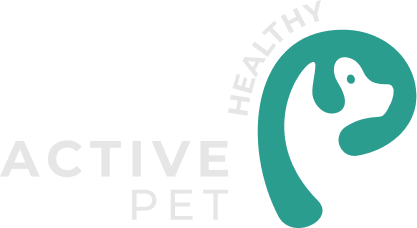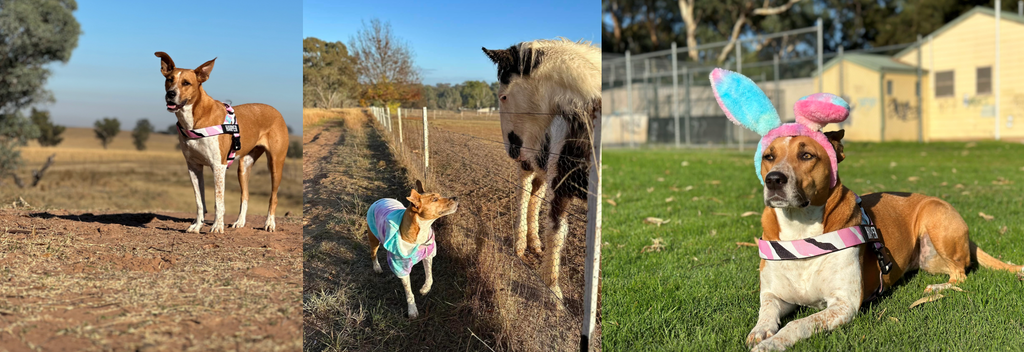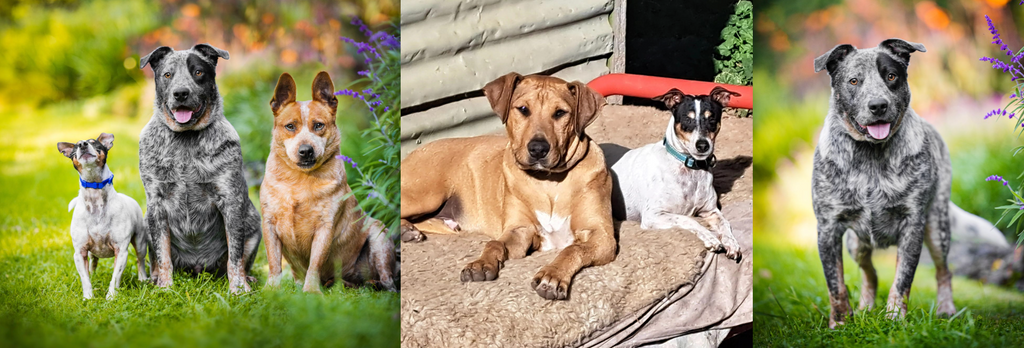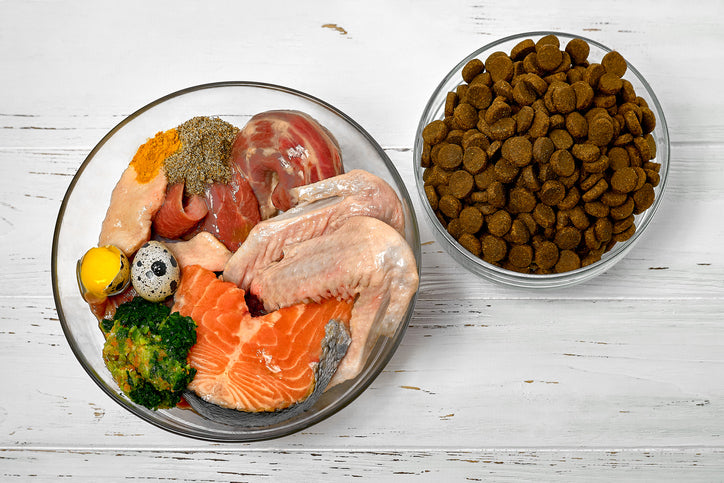
Why kibble can be unhealthy for your dog
While it may seem like a convenient option, it's essential to understand the potential health implications of feeding your dog kibble.
We'll take a closer look at the ingredients used in many commercial dog foods and how they can negatively impact your dog's wellbeing. Join us to learn the importance of a natural and balanced diet, as well as alternative feeding options for your beloved canine companion.
Key Takeaways:
- Kibble and commercial dog food may not always be the best choice for your dog's health
- Processed grains and artificial additives can have negative impacts on your dog's diet and health
- A natural and balanced diet, including whole-food ingredients, is essential for your dog's overall wellbeing
- Raw and homemade diets can be healthier alternatives to kibble and commercial dog food
- Consulting a professional can provide invaluable guidance when it comes to your dog's nutrition and health
Understanding the Ingredients in Kibble
As responsible pet owners, we want the best for our furry friends, including providing them with healthy and nutritious food.
Understanding the ingredients in your dog's food is crucial in ensuring their overall well-being. Unfortunately, many kibble brands use ingredients that may not be ideal for your pet's health.
Commonly found in commercial dog food are animal by-products, grains, and fillers that have little nutritional value.
Grains such as wheat, soy, and corn, are commonly used as fillers in kibble. While these ingredients may be inexpensive, they do not provide a complete source of nutrition for dogs and can even lead to health problems in some pets.
It's essential to read and understand the label of your dog's food for a better understanding of its ingredients. Look for high-quality sources of protein such as turkey, chicken, beef, or lamb and avoid fillers and by-products altogether.
| Ingredients to look for: | Avoid these ingredients: |
|---|---|
| High-quality, named proteins (turkey, chicken, lamb, beef, fish) | Animal by-products |
| Fruits and vegetables | Artificial preservatives (BHA, BHT, ethoxyquin) |
| Healthy fats (chicken fat, fish oil) | Corn, wheat, and soy |
| Probiotics and prebiotics | Sugar and artificial sweeteners |
Remember, providing your dog with a balanced, natural diet is essential in maintaining their health and longevity. By focusing on high-quality sources of protein and avoiding fillers and by-products, you can help ensure your dog's diet meets their nutritional needs.
The impact of processed grains on your dog's diet
As we discussed earlier, many commercial dog food brands use processed grains, such as wheat, corn, and rice, as fillers in their kibble. While these grains may help to bulk up the food and make it more affordable, they offer little nutritional value to your furry friend's diet and can actually do more harm than good.
The problem with processed grains is that they are often stripped of their natural nutrients during production. This means that they offer very little in the way of vitamins, minerals, and other essential nutrients that your dog needs to thrive. In fact, some dogs can experience allergic reactions to these grains, resulting in skin irritations, digestive issues, and other health problems.
Furthermore, processed grains can contribute to weight gain and obesity in dogs. This is because they are often high in carbohydrates and provide little in the way of protein or healthy fats. When these grains are consumed in excess, they can lead to a variety of health problems, including joint pain, diabetes, and heart disease.
The impact of processed grains on your dog's diet
| Issue | Possible Cause |
|---|---|
| Weight gain and obesity | High in carbohydrates, low in protein and healthy fats |
| Allergic reactions | Can cause skin irritations, digestive problems, and other health issues |
| Lack of essential nutrients | Processed grains are often stripped of natural nutrients during production |
If you're concerned about the role of processed grains in your dog's diet, consider switching to a food that is free from these fillers and rich in whole-food ingredients instead. You can see our freeze dried dog food here
You may also want to consider exploring raw and homemade diets that allow you more control over what your dog is eating and can offer a wider range of essential nutrients. You can see our home made dog food recipes here
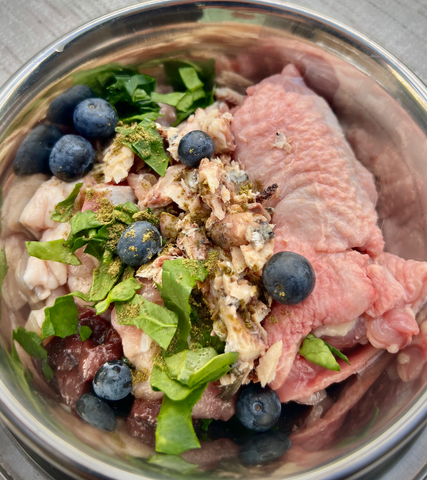
The Role of Artificial Additives and Preservatives
Many commercial dog food brands contain artificial additives and preservatives like BHA, BHT, and propylene glycol to improve the taste, colour, and shelf life of kibble. While it can make food look and taste more appealing, these ingredients can pose health risks to your furry friend.
Studies have linked some of these synthetic components to cancer, allergic reactions, and kidney damage, making it essential to be cautious about what you feed your dog.
"Feeding your dog commercial kibble is like letting your child eat a candy bar every day. It might taste good, but it's not healthy for them in the long run."
- Dr. Jane Smith, Canine Nutritionist
Some common artificial additives and preservatives to avoid in your dog's food include:
| Additive/Preservative | Potential Concerns |
|---|---|
| BHA | Linked to cancer and hormonal disturbances |
| BHT | Potential for organ toxicity and lung damage |
| Propylene Glycol | Can cause anemia and kidney damage |
Instead, focus on natural and whole-food based diets that prioritise your dog's health and well-being. By choosing high-quality, nutrient-dense ingredients, you can feel confident that you're providing your canine companion with the best possible nourishment to nourish their body and keep them happy and healthy for years to come.
Lack of Moisture in Kibble
One essential aspect of your dog's food is the amount of moisture it contains. Kibble or dry dog food usually has a moisture content of around 10%, which can be significantly lower than the recommended 70% moisture that most dogs need to maintain their health. Therefore, consuming only kibble without enough water intake can lead to dehydration and various urinary tract problems in dogs.
One solution to this is to add water to your dog's kibble before feeding it. This helps to decrease dehydration risks and can improve digestion. Alternatively, if you prefer to feed your dog a wet diet, there are plenty of high-quality, natural options available on the market. Wet food typically has a moisture content of around 75%, making it an excellent choice for dogs who require more hydration in their diet.
It's essential to note that switching your dog's food should be done gradually and under the guidance of a professional, as abrupt changes can cause digestive problems. Keeping your furry friend's diet appropriately hydrated is an important way to ensure their overall health and wellbeing.
You can see our home made dog food recipes here
Hydration Levels in Common Dog Foods
| Food Type | Moisture Content |
|---|---|
| Kibble | 10% |
| Canned Food | 75% |
| Semi-Moist Food | 25-35% |
| Raw Food | 60-80% |
It's important to ensure your dog's food includes sufficient moisture to avoid dehydration and urinary tract problems. Adding water to kibble or feeding your dog natural wet food can be an easy way to increase their daily water intake.
The Importance of natural and balanced nutrition
Feeding high-quality, natural, and balanced nutrition to your furry friend is vital to their overall health and wellbeing. Dogs require a diet consisting of a variety of fresh, whole-food ingredients to thrive.
Ensuring your dog receives a natural and balanced diet can provide numerous benefits, including a healthy coat and skin, strong bones and muscles, and improved digestion. In contrast, a diet that lacks essential nutrients can lead to various health problems, including lethargy, obesity, and dental issues.
When selecting dog food, be sure to read and understand the ingredients list to ensure you're providing your pup with the best possible nutrition. Avoid ingredients like fillers or artificial additives that can negatively affect your dog's health. Instead, look for high-quality proteins, healthy fats, fiber, vitamins, and minerals.
| Protein | Healthy Fats | Fibre |
|---|---|---|
| Salmon | Coconut oil | Pumpkin |
| Chicken | Olive oil | Sweet Potato |
| Turkey | Fish oil | Carrots |
By providing your dog with a diet that consists of natural and balanced nutrition, you'll be supporting their health and wellbeing throughout their life.
The benefits of raw and homemade diets
Raw and homemade diets are becoming increasingly popular among dog owners who want more control over their pet's nutrition. The benefits of raw and homemade diets are many:
- Nutritionally complete: Raw and homemade diets allow you to provide your dog with a nutritionally complete meal, free from the fillers and by-products found in many commercial dog foods.
- Higher moisture content: Raw and homemade meals contain higher moisture content, ensuring your furry friend stays hydrated and avoids urinary tract issues.
- Improved digestion: Homemade diets are often easier to digest, resulting in firmer stools and less digestive upset.
"Raw and homemade diets provide all the necessary nutrients in a natural form, without the preservatives and other chemicals found in processed dog food."
When creating a raw or homemade meal for your dog, it's important to ensure it's nutritionally balanced. Your dog's diet should contain:
- Protein
- Fats
- Carbohydrates (from sources such as sweet potato, pumpkin, and oats)
- Fruits and vegetables
- Calcium (from sources such as eggshells or bone meal)
- Vitamins and minerals (from supplements or natural sources such as organ meats)
Start by introducing small amounts of new food and gradually increasing the portion size over time. This will allow your dog to adjust to the new diet without any digestive upset.
You can see our home made dog food recipes here

Considering individual dietary needs and preferences
Just like humans, dogs have individual dietary needs and preferences. When choosing the right food for your furry companion, it's essential to take into account their specific needs and preferences to ensure they receive the right balance of nutrients and enjoy their meals.
There are several factors to consider when assessing your dog's dietary needs. Age, size, and activity level are critical when determining the amount of food your dog requires. Puppies and younger dogs may need higher levels of protein and fat to support their growth and development, while mature or senior dogs may need less of these nutrients to maintain their health.
Additionally, dogs with allergies or sensitivities require special consideration regarding their diet. You may need to avoid certain ingredients or opt for hypoallergenic food to reduce the risk of adverse reactions. In cases where your dog has a specific medical condition, such as kidney disease or diabetes, it's crucial to discuss the appropriate dietary requirements with your veterinarian.
Addressing Dietary Preferences
Understanding your dog's dietary preferences can help you select food that they will enjoy and ensure they eat enough to maintain a healthy weight. Some dogs may prefer wet food over dry food, while others may prefer a specific protein source such as chicken or fish. Consistently choosing food that your dog enjoys can also help prevent picky eating and other mealtime issues.
When it comes to deciding on the type of food to feed your dog, there are several options available that cater to individual preferences. Grain-free, vegetarian and vegan, dairy-free, and low-fat food options are all available. Some foods also include unique proteins such as bison or lamb, which can be ideal for dogs with allergies or sensitivities to more common proteins like chicken or beef.
Individual Dietary Needs and Preferences
| Dog Trait | Dietary Considerations |
|---|---|
| Age | Puppies and younger dogs require higher levels of protein and fat, while senior dogs may require lower levels of these nutrients. |
| Size | Smaller breeds require smaller portions while larger breeds require more significant amounts of food. |
| Activity Level | Dogs with higher activity levels require a higher number of calories to maintain their energy levels. |
| Allergies and Sensitivities | Dogs with allergies or sensitivities may require a special diet, including unique protein and grain sources. |
| Medical Conditions | Dogs with medical conditions will require specific diets recommended by a veterinarian to manage their condition effectively. |
By taking your furry friend's dietary needs and preferences into account, you can ensure that they receive the right nutrients, enjoy their meals, and maintain optimal health.
Transitioning from Kibble to a Healthier Diet
If you have decided to transition your dog from kibble to a healthier diet, it is important to make the change gradually. Suddenly switching their diet can cause digestive disturbances and upset their stomach. A gradual transition will help your furry friend adjust to their new diet and ensure success.
First, make sure you have selected a nutritious and balanced diet that meets your dog's nutritional needs. You may choose raw or homemade options, but make sure to consult with your veterinarian or a canine nutritionist.
Start by introducing small portions of the new food and mixing it with their current kibble. Gradually increase the amount of new food while decreasing the amount of kibble over a period of 7-10 days. Keep an eye on your dog's behaviour and stool to make sure they are handling the transition well.
Remember, every dog is unique and may require a different transition period. Take cues from your furry friend's behaviour and adjust the transition accordingly. We understand that transitioning may seem daunting, but with patience and the right approach, you can ensure your dog receives the best possible nutrition for a long and healthy life.
You can see our home made dog food recipes here
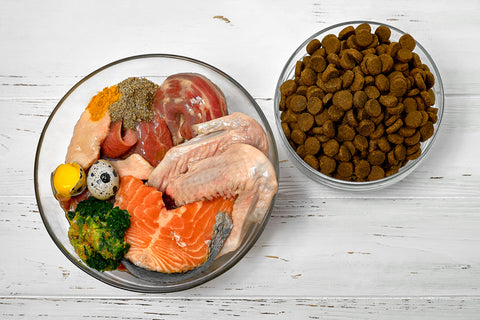
FAQ
Why can kibble be unhealthy for my dog?
Feeding your dog kibble or commercial dog food can have potential health concerns. Despite being convenient, it may not always be the best choice for your dog's well-being.
What should I understand about the ingredients in kibble?
To fully comprehend the potential health implications of kibble, it's essential to examine the ingredients used in its production. We'll discuss the common components found in many commercial dog foods and how they can affect your dog's overall health.
How do processed grains impact my dog's diet?
Processed grains, often used as fillers in kibble, can lead to digestive issues, allergies, and weight problems in dogs. We'll explore their negative consequences on your dog's diet.
What is the role of artificial additives and preservatives in kibble?
Many kibble brands include artificial additives and preservatives to enhance taste, appearance, and shelf life. However, these synthetic ingredients can pose potential health risks and impact your dog's well-being.
Why is the lack of moisture in kibble a concern?
The low moisture content in kibble can potentially lead to dehydration and urinary tract problems in dogs. We'll discuss alternative feeding options to ensure your furry friend stays adequately hydrated.
Why is natural and balanced nutrition important for my dog?
Dogs, like humans, thrive on a diet that consists of natural and balanced nutrition. Providing your furry companion with high-quality, whole-food ingredients is essential for their overall health and well-being.
What are the benefits of raw and homemade diets?
Raw and homemade diets have gained popularity as healthier alternatives to kibble. We'll discuss the potential benefits of these feeding approaches and provide guidance on how to safely and nutritionally create balanced meals for your pup. You can see our home made dog food recipes here
How should I consider my dog's individual dietary needs and preferences?
Every dog is unique, with their own dietary needs and preferences. It's important to take these factors into account when selecting the right food for your canine companion and addressing specific issues such as allergies or sensitivities.
How can I transition my dog from kibble to a healthier diet?
If you decide to transition your dog from kibble to a healthier diet, it's essential to do so gradually. We'll guide you through the process of slowly introducing new foods to avoid digestive upset in your furry friend and ensure a successful transition.
